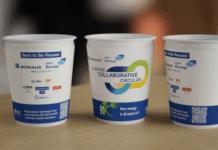
The second Save Food Congress, a joint initiative of the FAO, UNEP and Messe Düsseldorf, was held alongside interpack in May last year and is now charting the course for further development in the coming years. From now on it will be holding additional meetings in the years between interpack editions, with the events being hosted by brand manufacturers in the food industry. The first such meeting will take place on 11 and 12 May 2015 at the headquarters of Nestlé in Vevey, Switzerland.
The second Save Food Congress, a joint initiative of the FAO, UNEP and Messe Düsseldorf, was held alongside interpack in May 2014 and is now charting the course for further development in the coming years The Save Food Meeting 2015 will be a gathering point for the partners from the industry, who now total more than 120, and the approximately 230 NGOs and research establishments that are registered with the FAO. Beyond this, the meeting is open to attendance by all companies interested in the issue of food waste and loss. The aim of the meeting is to stimulate dialogue between representatives from industry, science and research, policymakers and persons from civil society and to provide the impetus for launching pilot projects. Consequently, the event on the shores of Lake Geneva will be held under the motto ‘Private sector support for food loss and waste reduction projects.’
The various speakers at the meeting will be presenting existing successful projects to fight food loss and waste which have been organized with private sector participation. Other presentations will discuss the possibilities for embarking on public-private collaborative projects. Among the speakers there will be representatives from Tetra Pak, McCain and the VDMA association. In one lecture, the Save Food initiative will be providing an update on the Mango Project it has initiated in Kenya. With the participation of several corporate members of Save Food, this project focuses on the use of effective processing and packaging technologies to reduce mango losses and to create more value added in the country itself. In addition to meeting rising domestic demand more efficiently, the aim is also to achieve a substantial increase in exports.
The meeting will also premiere a new version of the Save Food exhibition. Besides illustrating in detail the extent of food losses and waste around the globe, it offers an overview of the various projects by Save Food members and provides information about the engagement of individual member companies or associations. The exhibition is modular in design and has been optimized for easier transport. Among the venues at which it will be staged in 2015 are the Process Expo in Chicago and the Scanpack in Gothenburg.










